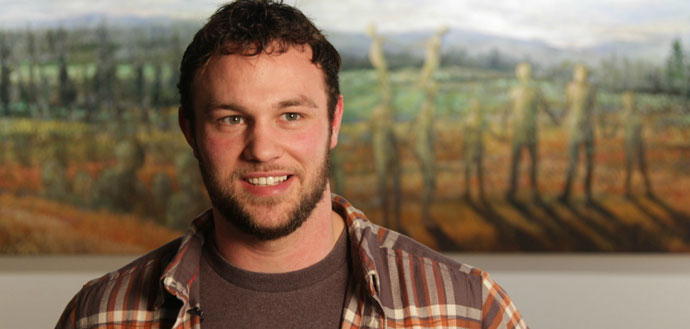Professionalism. Relationships with faculty. A deeper understanding of his subject. Friendship. Confidence. CPHHS Senior Jonathan Wymore added all these things and more to his college resume because of the Center for Healthy Aging Research’s LIFE Scholars program.

A nutrition major, Jonathan spent the summer using micro CT imaging to analyze bones at the cellular level for density and strength to determine the effects of cancer treatment drugs and exercise on bone loss. Long hours at the microscope had two immediate payoffs – two new friends and an appreciation for ’Ol Blue Eyes Frank Sinatra, who often was heard crooning on the lab’s CD player.
For Jonathan, the research was close to home. His grandmother died of breast cancer that metastasized to her lungs, and his mother twice battled the disease. In fact, his mom became ill during his freshman year, and Jonathan struggled not only with the transition to college but also with caring for his mom, who raised six kids on her own and who was supported by an extended community family. Jonathan carries no fewer than four photos of her in his wallet, including a prom photo from 1969.

For his first and second years at OSU, Jonathan worked 25 hours a week to pay for health insurance, but his 3.0 GPA, in his eyes, wasn’t acceptable. His junior year, he continued to work and was also accepted as a CHAR LIFE Scholar. That’s when things changed.
“I had many struggles in my childhood,” he says. “We were not well off financially, and my father was not around. I told myself I would work hard and accomplish things with my life, so I can turn things around and eventually give back and provide for my family and community. I honestly feel like this research experience was one of those ‘big opportunities’ that is going to help open doors to being a successful professional. I’m so thankful for this opportunity. Not to sound cliché, but it was truly a life-changing experience.”

One of the ways it made a difference, in addition to giving him a deeper understanding of what he’s learning in the classroom, is the benefit of a mentor in Assistant Professor Ursula Iwaniec, whom he visited with at least three times a week outside of nutrition class. “I’ve never met another professor who wants me to succeed as much as she does,” he says. “She’s an amazing mentor.”
In addition to Iwaniec, he met others in the field “I never knew I could network with,” he says. “At no other time as an undergraduate would I meet a professor doing this type of work.”
Through the Life Scholars opportunity, he also got professional advice, learned lab techniques, computer language and how to “speak their language and relate it to my experience,” says Jonathan.
“A lot of undergraduates misunderstand research. They’re afraid it’s boring, think it’s intimidating or don’t know professors or how to apply. But there are lots of opportunities to get involved,” he says. “For me, the experience was beyond amazing. I’m happy someone took a chance on me. I made two of the best friends I’ll probably ever have in my life, and the experience will surely open doors in the future.
“And it wasn’t boring, either.”
About the LIFE Scholars Program
The Center for Healthy Aging Research (CHAR) undergraduate research program began in 2006 to encourage students to consider the field of aging while working with experienced researchers. During the past six years, the LIFE Scholars Program has served 37 undergraduates. Fifty-nine percent have been women, and 19 percent have been underrepresented minority students.
The program provides lifelong skills in research, inquiry and investigation and is highly rated by participants and mentors. In Summer 2011, it was funded by contributions from the Bill and Judy Winkler Fund for Promoting Positive Lifestyles and Healthy Aging, matched by support from participating departments in CHAR.
The 2011 cohort of LIFE Scholars included eight students who worked in diverse fields and departments, conducting research on circadian rhythms, breast cancer metastasis to bone, glutamate receptors and memory, whole body vibration and diabetic neuropathy, aging-in-place, and protein hormones and bone loss.